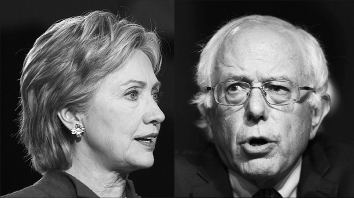Who really won the first Democratic primary debate?
I’m a Berning man, and throughout the debate, was excited to see our underdog candidate given the same airtime and exposure as ‘front-runner’ Hillary Clinton. Many of my fellow Berners were surprised after CNN’s first debate, however, when almost all media coverage declared Hillary Clinton the winner, despite poll numbers from almost every independent poll showing Bernie to be the audience favorite! They soon discovered that CNN is owned by Time Warner Cable, who donated some $500,000 to Hillary Clinton’s campaign. It is worth noting that Bill Clinton was in office when he signed off on the Telecommunications Act of 1996, a sweeping bill that heavily deregulated the telecom industry, setting the stage for a series of mergers and acquisitions by massive media corporations to reshape our media ecosystem.
So is it that simple? Is Time Warner simply protecting their ‘asset’ in the Clinton dynasty when their networks claim Hillary the winner of the October 13 debate?
Yes, it is. But you should also consider the following to gain a better understanding why elections are important to Time Warner, News Corp, Viacom, GE, and other radio, internet, television, news and media giants in the first place. A good place to start is in 1976, with a Supreme Court case called Buckley v. Valejo, whose decision would strike down limits on campaign expenditures by political candidates. Well, now campaigns could spend as much as they want, but what fun is that if there are still limits on how much an individual can contribute to a campaign? Over the next 40 years, a string of cases would weaken those limits, but we would have to wait until the Citizens United vs. FEC case in 2010 for the floodgates to be opened to contributors. Be ye corporation or wealthy individual, this ruling allows you to spend unlimited amounts on ‘independent’ political expenditures. This was the ruling that would lead to the SuperPAC.
If you don’t understand what a SuperPAC is, that’s understandable. Campaign finance law is confusing. A SuperPAC is a committee that can spend unlimited funds in order to ‘support’ a candidate, as long as they do not ‘coordinate’ with that candidate, and they are responsible for the steady upsurge of political television and radio ads over the past five years. Before 2010, individuals were limited to $2,500 per contribution per Political Action Committee, and corporations could not contribute at all.
Although Time Warner donated over $500,000 to Hillary Clinton’s presidential campaign, and spends almost ten MILLION dollars on all political expenses, including lobbying, per election cycle, this is nothing compared to what SuperPACs do for Time Warner. According to NPR’s estimate, revenue collected by television broadcasters this election cycle could exceed four and a half billion dollars. And that is not including radio, print, or digital ads, which are expected to rise from $22 million to $1 billion from 2012’s election to 2016. That is a lot of money for the Time Warners, Viacoms and Comcasts of the nation.
The problem that I have with this is not that Bernie Sanders isn’t getting the recognition that I think he deserves from CNN. The problem is that all this money pouring into our elections undermines democracy. The 1952 election was the first election to have televised political ads. The New York Times: Upfront called 1960 ‘the first mass media election’ when over 70 million Americans (in a country of 180 million) watched the presidential debates. “That 1960 race changed a lot, and you can see its impacts still,” said Vanessa B. Beasley, a communications professor at Vanderbilt University. “It changed who ran for office.” Since 1960, television and mass media have played a bigger and bigger role in elections.
And the amount of money a campaign would have to spend to run in this new world of mass media elections would rise in lock step over the years. In order to raise that kind of money, what concessions does a politician have to make for the wealthy individuals and corporations who support their campaigns?
In a display of equal brilliance and irony, perhaps Donald Trump said it best, in what better place than during the GOP’s first primary debate on August 6th: “I will tell you that our system is broken,” he said. “I give to everybody. When they call, I give. And do you know what? When I need something from them two years later, three years later, I call them, they are there for me.” So, returning now to the question of who won CNN’s first Democratic party primary debate on October 13th?
Time Warner won, obviously. And despite all of Hillary’s talk of opposing the Trans Pacific Partnership and the Supreme Court’s Citizens United ruling, you have to wonder which candidate will be there when their wealthy corporate donors come calling.
Gabriel is a New York City transplant, glad to be living in the real jungle instead of the urban one. He is a senior at the Evergreen State College, and slap the bass for local rock outfit Fruit Juice.
Submitted by the author, this article was originally published in the Cooper Point Journal.

Be First to Comment